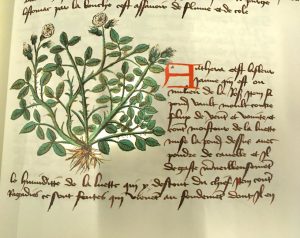February 9, 2021, by Kathryn Steenson
Simple Medicine
Post by Library Assistant Safiya Williams.
There is a great pleasure, and sometimes amusement, in reading through old texts that cover topics of the human body and cures for its many ailments. Books on herbalism and herbal remedies give us an idea of those who came before us – without the support of modern medicine, engineering and the NHS – how they lived, died and interacted with the natural world.
 ‘Livres des Simples Medicines’ (Simple Medicine Book) is a French text of medieval science which originated from the Royal Library of Belgium, and was distributed under multiple titles from the 15th Century through to the 16th Century. ‘Livres des Simples’ is described as a ‘medieval herbal’, an ‘herbal’ being a dictionary of medical substances in alphabetical order, with information about the substance, an accompanying image and any ailments it may have treated. Within those treatments, for every ointment or suppository that may appear suspect to the modern mind, there are still many remedies that remain familiar and relevant.
‘Livres des Simples Medicines’ (Simple Medicine Book) is a French text of medieval science which originated from the Royal Library of Belgium, and was distributed under multiple titles from the 15th Century through to the 16th Century. ‘Livres des Simples’ is described as a ‘medieval herbal’, an ‘herbal’ being a dictionary of medical substances in alphabetical order, with information about the substance, an accompanying image and any ailments it may have treated. Within those treatments, for every ointment or suppository that may appear suspect to the modern mind, there are still many remedies that remain familiar and relevant.
The eighth most asked ‘how to…?’ question searched on Google in 2020 was ‘How to boost immune system’; I’m sure you won’t be surprised to learn that the search term reached its peak some time around mid-March, whilst breakout topics and queries within the search were a popular health food chain and searches for boosting immunity ‘naturally’. Personally, whenever I feel the signs of a cough or cold coming my first instinct, like many, is to run out and buy a jar of honey and a bag of lemons. So, whilst it’s still feeling quite grey and cold, I wanted to see what was recommended by our simple medicine book for the cold season and winter blues.
The three items listed below are what seems relevant and possible based on ingredients one may have in the modern kitchen:
 Honey
Honey
Along with lemons and ginger, honey may be one of the first things that many of us naturally reach for at the first sign of a cold, and is quite often used for many other ailments – so much so that it has its own branch of alternative medicine known as ‘Apitherapy’. Our Livre’ suggests the simple, but well-worn trick of drinking honey with hot water for “cold humours”.
Liquorice
Another remedy that is similarly known, but perhaps not as popular is Liquorice, our medicine book suggests that “…the wine in which it has cooked is good for a cough.”, which I imagine wouldn’t be too dissimilar to our modern cough syrups. However if you’re looking for something with a little less preparation, there is also the following suggestion: “To ease roughness of the throat and stomach … good to chew liquorice or to hold it on the tongue”.
Rose
Perhaps you are in the aftermath of a cold and feel in need of something to make you feel a little perkier? Our book suggests roses may be the answer, whether breathing in their scent to fortify “…the brain and heart and restores spirits.”, or even “If one washes the face in rose water, it makes the flesh firm and gives good colour”.
This and many other books on historical herbal remedies are held at Manuscripts and Special Collections. Our Reading Room is currently restricted to staff and students at the University of Nottingham, but once lockdown ends we hope to be able to welcome back all our readers. See our homepage and Twitter for updates. Until then, our enquiry and copying services are running as normal.
All images and quotes via: Opsomer-Halleux, C., Stearn, W.T. & Bibliothèque royale Albert Ier, 1984. Livre des simples medecines : codex Bruxellensis IV. 1024 : a 15th-century French herbal, Antwerp: De Schutter (Ref: Special Collection Oversize RS164 LIV)
No comments yet, fill out a comment to be the first

Leave a Reply